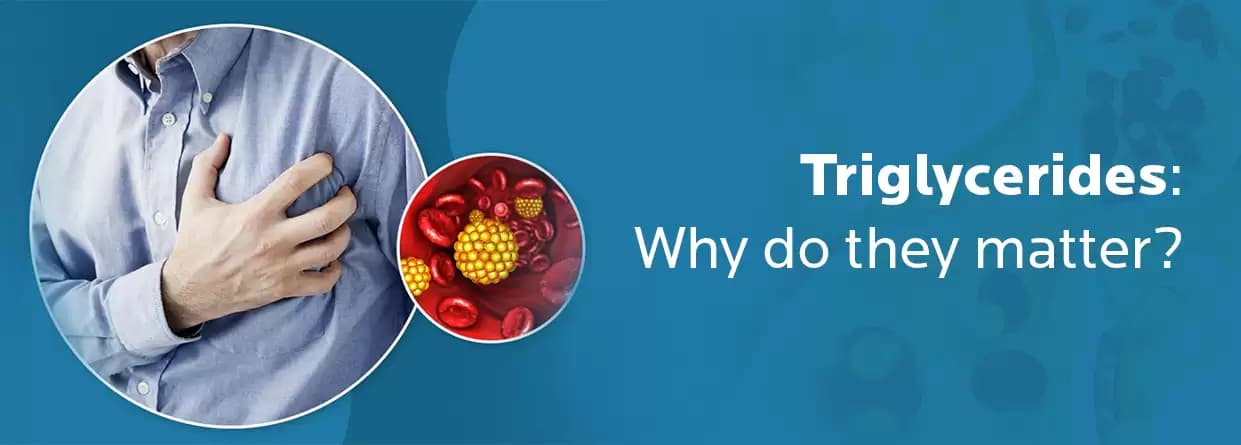
We have all heard for years that cholesterol is not good for our hearts. Although, there is another player that plays an essential role in heart health equally is triglycerides. Both triglycerides and cholesterol are fats in the blood and if the levels are too high, they lead to enhancing the risk of heart attack and stroke according to the research.
We have all heard for years that cholesterol is not good for our hearts. Although, there is another player that plays an essential role in heart health equally is triglycerides. Both triglycerides and cholesterol are fats in the blood and if the levels are too high, they lead to enhancing the risk of heart attack and stroke according to the research. In this article, we will discuss why triglycerides matter so stick to the end. However, note that it is for informational purposes only and doesn’t interrupt the consultation of a cardiologist.
Triglycerides are vital fats that one can obtain from foods such as meat, oil, and butter. Most of the fat in the human body are triglycerides as they are calories that are unused we eat but don’t require. They are present in the blood and help in moving adipose fat from one tissue to another and glucose in the blood from the liver. It is also known as one of the important elements of human skin oils. Eating too much food or high-fat food that the body doesn’t need is stowed in the fat cells in the triglycerides form instantly. There are VLDL cholesterol particles in the body that are useful in moving triglycerides to the tissues. The enzyme lipase involves causing the breakdown of the triglycerides into fatty acids and monoglycerides.
Both cholesterol and triglycerides are not similar fats and are different from each other that keep circulating in the body. Triglycerides benefit in storing and using the fats that help in converting into energy when the body needs it. Cholesterol is vital to building cells, tissues in the body, and hormones such as testosterone and estrogen.
Triglycerides' normal range is important to ensure good health. If the levels of triglycerides are high, then it can lead to heart issues such as coronary artery disease, atherosclerosis, heart attacks, etc. High levels can also lead to enhancing the risk of pancreas inflammation referred to as pancreatitis.
High levels of triglycerides occur because of daily consumption of excessive amounts of calories that the body is unable to use instantly. It happens because of the following reasons:
High triglyceride levels usually don’t cause any symptoms. However, they can lead to causing some serious complications. People with high triglyceride levels can experience problems like inflammation in the pancreas, vomiting, nausea, fever, appetite loss, and abdominal pain.
There are many factors due to which triglycerides level keep fluctuating naturally which include regular intake of calories and time of day. Eating a high-calorie meal can upsurge the levels of triglycerides and the body might store it for further use to convert into energy when it is required.
However, these fluctuations are short-lived, but they are known to be the segment of the reason why healthcare professionals might ask the patient to fast prior to the lipid profile blood test.
There are health conditions that might enhance the risk of increased triglycerides level. Here are some of them:
You want your triglycerides to be below 150 mg/dL. Borderline high triglycerides are from 150-199 mg/dL. Triglyceride levels indicate a high risk for heart disease above 200 mg/dL.
The healthcare professionals usually recommend making certain lifestyle changes at first and if it doesn’t work, then they prescribe medicinal treatment options to the patients. Here are some lifestyle changes which are asked the doctor to follow for triglycerides treatment:
If lifestyle changes aren’t working well to treat high triglycerides levels, your doctor might suggest:
Triglyceride's high levels can lead to enhancing the heart disease risk and pancreatitis. It is important to manage eating and drinking as it causes high triglyceride levels. Fortunately, there are steps you can take to reduce triglyceride levels. If you are diagnosed with the condition, your doctor will recommend lifestyle changes and medications that are effective for your heart health and reducing the triglycerides levels. You can consult a cardiologist doctor in Kolkata at the BM Birla Heart Research Centre, one of the cardiac care and linked healthcare services offering the best patient care and treatment services.
500 mg/dL and above is considered to be the most dangerous triglyceride level.
Making certain lifestyle changes help to reduce high triglycerides levels such as exercising, eating heart-healthy food, quitting smoking, reducing alcohol, etc.
Written and Verified by:

Dr. Ashok B. Malpani is a Senior Consultant in Cardiology Dept. at BM Birla Heart Hospital, Kolkata, with over 34 years of experience. He specializes in complex angioplasty, primary angioplasty, and pacemaker implantation.
Similar Cardiology Blogs
Book Your Appointment TODAY
© 2024 BMB Kolkata. All Rights Reserved.